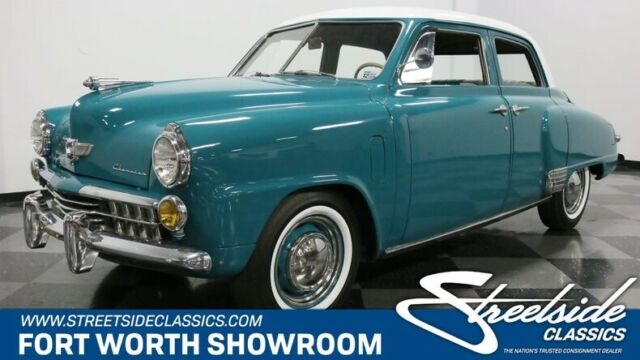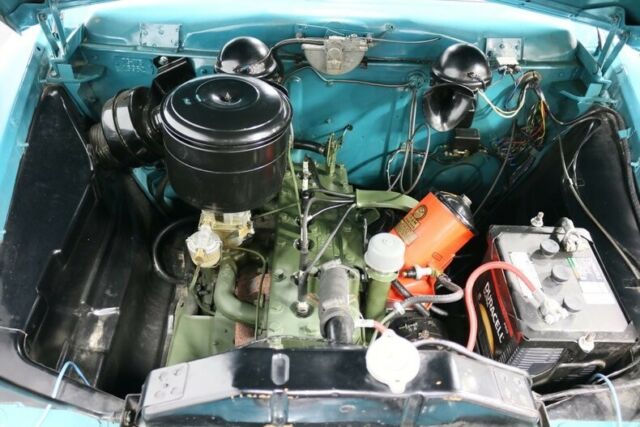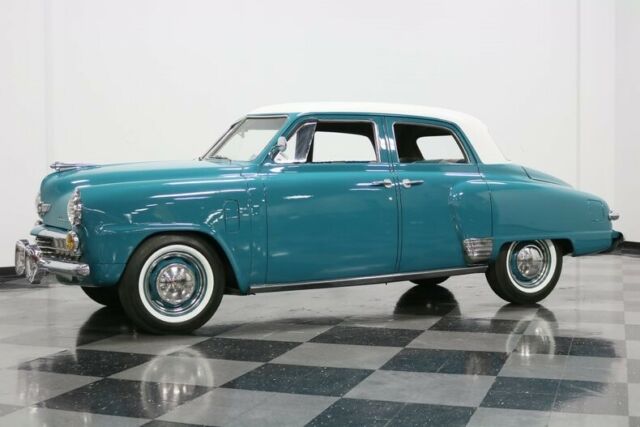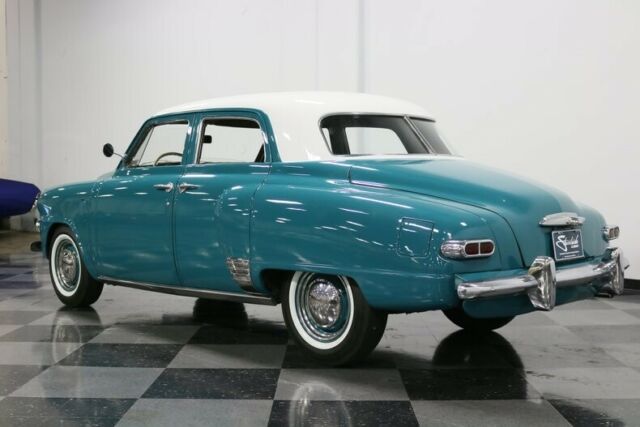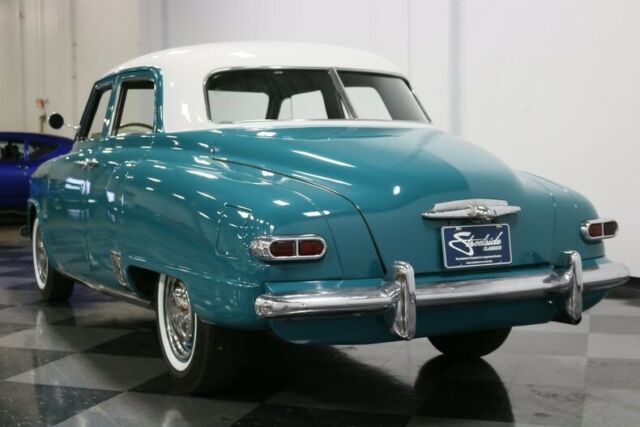classic vintage collector post war stude flat 6 manual overdrive
- Location: Local pick-up only
- Condition: Used
- Make: Studebaker
- Model: Champion
- Type: Sedan
- Trim: --
- Year: 1948
- Mileage: 5714
- VIN: 392679
- Color: Teal
- Engine size: 2.8 I6
- Power options: --
- Fuel: Gasoline
- Transmission: Manual
- Interior color: Teal
- Options: --
- Vehicle Title: Clear
1948 Studebaker Champion -- Description
Following the war, all the automakers were scrambling to get new hardware out the door, but Studebaker was one of the first to offer a truly new design with the 1947 Champion and Commander. With its distinctive and striking wrap-around rear window, this 1948 Champion offers ground-breaking styling that still looks great today combined with durable, thrifty performance that made them a very popular choice back in the day. The neat little Champion was the right car at...the right time and maybe that time has come again. The size and proportions are just about perfect and it has a slick 1940s look that makes folks smile everywhere it goes. This particular teal paint shade wasn't available on '48s (although it's somewhat close to Peacock Green) but it obviously looks right on the Stude's sleek bodywork, especially with the off-setting white roof. Resprayed recently, the paint is very nice and shows no obvious imperfections or flaws, but it's certainly not a $20k finish for a trailer queen, because that's not what Studes are meant to wear. The doors fit well, the cowl vents work properly, and that dramatic 2-piece wrap-around rear window (curved glass was quite the novelty in 1948) never fails to get people talking. Plenty of bright trim is standard fare for the era, and it's all in decent condition that would perk up a bit with a good polishing, although a full replacement would better match the paint finish. The future arrived inside, where there's a surprising amount of space for a smallish four-door. Both benches have been upholstered in two-tone vinyl fabric that matches the exterior paint scheme, and all four door panels are taut with the same matching pattern, which looks awesome and ties the whole car together. The burled walnut is very elegant, and strangely puts the clock front and center, with auxiliary gauges on the left and the speedometer on the right. The row of switches and knobs underneath control things like the windshield wipers, headlights, and overdrive for the 3-speed manual transmission. The original AM radio is fitted in the center, right above the heater controls and you'll dig the Champion badge emblazoned above the glove compartment. There's also a reasonably-sized trunk out back that includes a period-style mat, providing plenty of room for all your car show needs. Studebaker's reliable 2.8L flathead six seems modest on paper, but in the lightweight Champion, particularly when paired with overdrive, it's a fun little engine. The engine bay is very nicely finished with olive green paint on the block, a correct downdraft carburetor, and correct hoses and clamps. The wiring was replaced during the restoration years ago and it still uses its original 6-volt generator to make electricity. It has been fitted with an updated exhaust system that gives it a great 6-cylinder grumble and the chassis is in good condition without being so over-detailed that you're afraid to drive it. That box on the passenger's side of the undercarriage is for the heater and even without power assist, the steering is light and easy. Stock gears out back give it plenty of zip around town, but with the overdrive system operating, it'll cruise on the highway at 65 MPH without complaints. Matching teal wheels are fitted with really nice hubcaps and trim rings, as well as a set of F78-15 whitewall bias-plys that give it a flashy look. This is a neat little car with a lot of appealing features for not a lot of money. Studebaker was on a roll following the war and even today there's a big group of guys who think they're the best thing going. Call today!
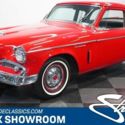 Stude Straight 6 Manual Classic Vintage Collector Classic Red Gray Brown
Stude Straight 6 Manual Classic Vintage Collector Classic Red Gray Brown
Mileage: 9894
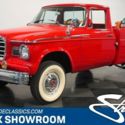 Straight Six Manual Classic Vintage Collector Stude Red Black Restored
Straight Six Manual Classic Vintage Collector Stude Red Black Restored
Mileage: 11025
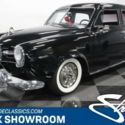 Inline 6 Manual Black Gray Classic Vintage Collector Bullet Nose Stude Receipt R
Inline 6 Manual Black Gray Classic Vintage Collector Bullet Nose Stude Receipt R
Mileage: 18661
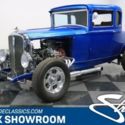 Stude Hot Rod V8 Auto Classic Vintage Collector Restored Receipts SBC Custom Blu
Stude Hot Rod V8 Auto Classic Vintage Collector Restored Receipts SBC Custom Blu
Mileage: 600
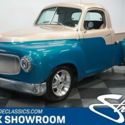 V8 Auto Classic Vintage Collector Stude Truck 2R Restored A/C Edelbrock
V8 Auto Classic Vintage Collector Stude Truck 2R Restored A/C Edelbrock
Mileage: 94
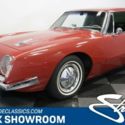 Barth Stude V8 Auto Classic Vintage Collector Edelbrock Red Black Restored Recei
Barth Stude V8 Auto Classic Vintage Collector Edelbrock Red Black Restored Recei
Mileage: 20621
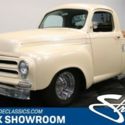 Stude Truck Custom Fresh Classic Vintage Collector V8 Auto P/U White Low Resto M
Stude Truck Custom Fresh Classic Vintage Collector V8 Auto P/U White Low Resto M
Mileage: 1820
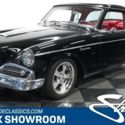 Stude Stroker Smeding V8 Auto Classic Vintage Collector Custom Rare Black Red
Stude Stroker Smeding V8 Auto Classic Vintage Collector Custom Rare Black Red
Mileage: 16456
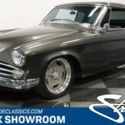 Stude V8 Auto Upgrade Starlite Star Light Classic Vintage Collector Grey Receipt
Stude V8 Auto Upgrade Starlite Star Light Classic Vintage Collector Grey Receipt
Mileage: 64
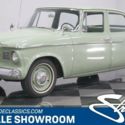 Classic vintage original Stude lark
Classic vintage original Stude lark
Mileage: 52781
